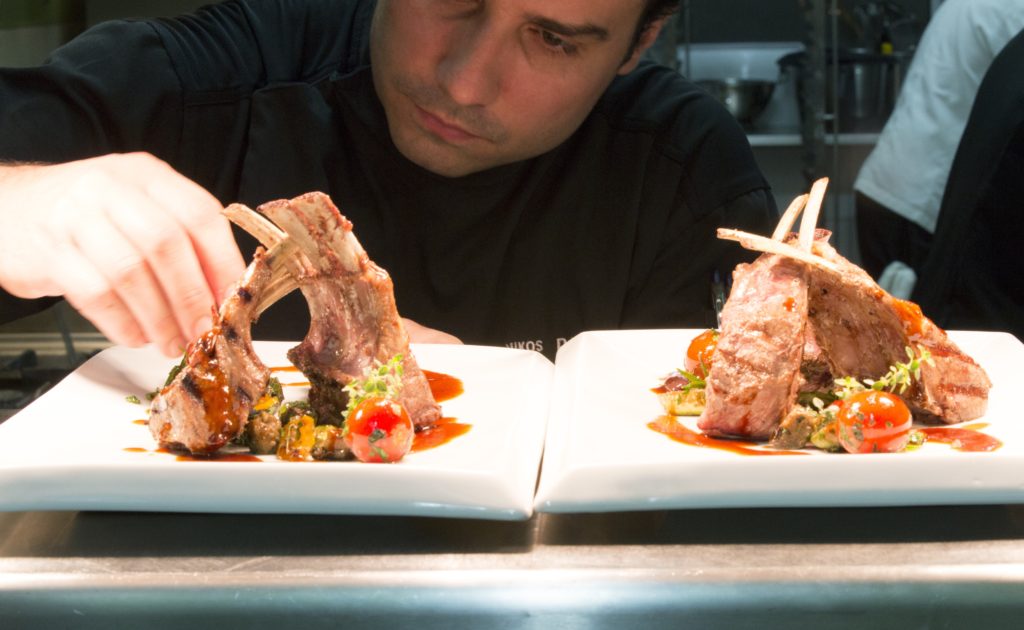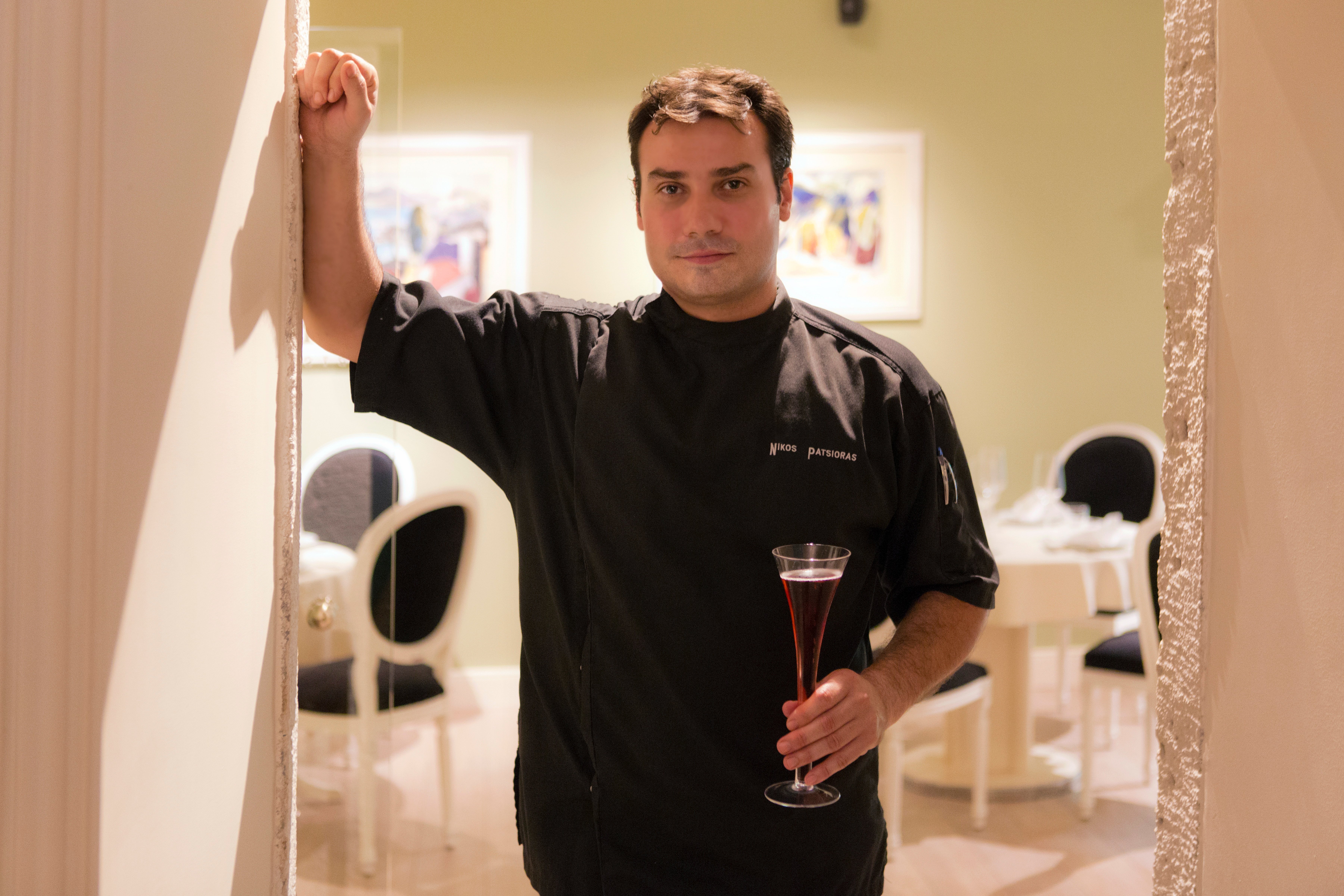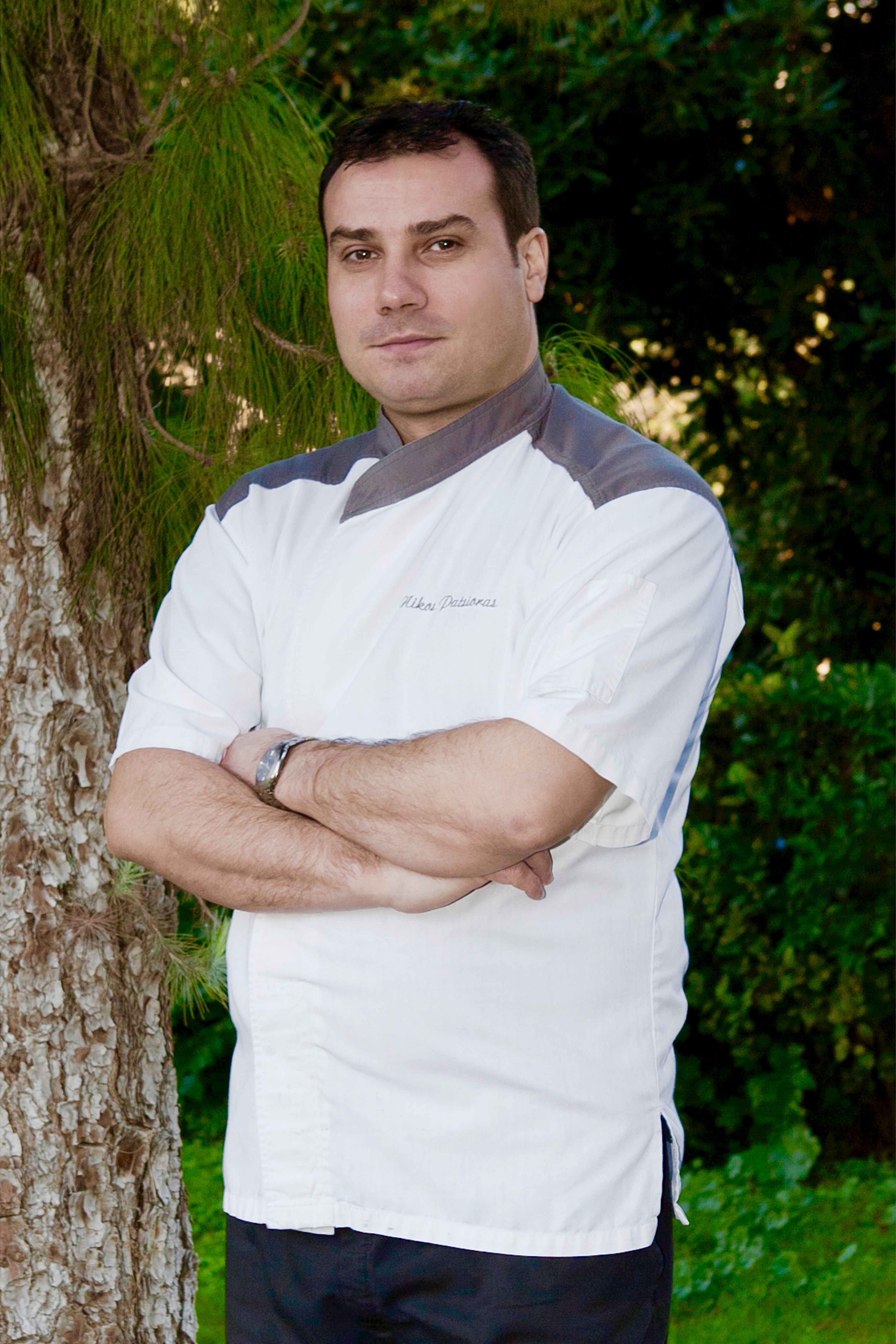“Hellenic Cuisine is an Inexhaustible Source of Inspiration” Interview with an International Chef Nikos Patsioras
- Interviews
-
May 29
- Share post



1) We are very pleased that you will now be formally supporting the scientific team for “Greek taste beyond borders” (GTBB) on the international campaign that began within the context of the first International Hellenic Gastronomy Conference. Tell us how you feel about this unique honor?
Thank you very much for inviting me to participate on a team with such an important mission. I am tremendously happy and it is also a great honor to contribute to such a commendable endeavor. The promotion of Hellenic gastronomy and its global promotion are a major incentive for joining our forces, to work together and give it the credit it deserves. I am very delighted about this collaboration and willing to support and reinforce this effort with everything at my disposal.
2) Tell us about your international career and your love of cooking. How did you start?
I grew up in an environment where our fresh produce was always available at home. From a small age I watched with great interest as various meals, sweets and pastries came to life as they were lovingly prepared with the purest ingredients in our home’s kitchen. The tasty traditions were always faithfully observed at celebrations. These memories and tastes were unforgettable; I became attached to the kitchen and the freshness of Greek nature, which has generously endowed us with so many quality products. I acquired an appreciation for manually prepared home cooking with the freshest ingredients from a young age and at some point I decided to take up cooking professionally.
I realised as soon as I could walk that the kitchen is an infinite world, full of challenges with countless choices and how far I wanted to travel and wander was up to me. From the very first moment I felt that I belonged and never saw cooking as work. Cooking is my passion. This profession has been defined as cosmopolitan. The fact that you can travel anywhere to work, broaden your knowledge and meet knew places and cultures, has been a great challenge for me over time. Travel is an investment in knowledge and life.
Since the beginning of my career I wanted to travel to other countries; to learn as much as possible and made the decision to travel abroad. I began looking abroad after I graduated from the Chef D’ Oeuvre College in Athens. I decided to go to London. I took the N.V.Q. Level 4 Kitchen & Larder Specialist, a specialized cooking course at the Westminster Kingsway College. I successfully completed the course and graduated, whilst working at the Heathrow Airport Sheraton Skyline Hotel.
One my biggest dreams and next challenge was to work at a Michelin Star restaurant in France. I did not speak French at all and it was very difficult, but not impossible. After many efforts I travelled to Lyon to see the prospects first-hand and managed to find what I wanted. After a brief trial period, I started working at Les Cepages, a Michelin Star restaurant on the French and Swiss borders. I continued my culinary adventures through France; along the way I worked at haute cuisine and Michelin Star luxury hotel restaurants: Chateau de Divonne, Domaine de Divonne, Chateau de Bagnols and at the renowned Le Bristol in Paris.
For many years I travelled backwards and forwards between Greece and abroad. One of the places that I regularly visited was London, where I worked at hotels such as the historical Savoy, Montcalm Hotel at the Brewery and its restaurant, the Chiswell Street Dining Rooms at the Waterloo Novotel and the London Marriott Grosvenor Square. I also worked with Smith’s Catering, the Royal Institution of Great Britain, as well as the Tower of London.
At the same time, whenever the opportunity arose to enrich my knowledge and learn more, I would complete a stage at award-winning restaurants such as: La Bastide de Saint Antoine at the Jacques Chibois (Relais & Chateaux, 2* Michelin), the French Grasse, the Capital in London (2* Michelin), the Sea Grill at Yves Mattagne (2* Michelin) in Brussels, where I worked a couple of years ago and in Crete. I succeeded in travelling to several places and also worked in other countries, such as Holland, Denmark, Germany and Croatia. After so many years in the kitchen, I can confidently say that the journey into the culinary world is never ending. Food knows no boundaries and there are always culinary challenges and many things to discover.
3) How do you comprehend and perceive Hellenic gastronomy?
Hellenic gastronomy for me represents a huge diversity that consists of quality flavours and excellent products of a high nutritional value with significant health benefits. Hellenic cuisine is the maternal cuisine that has nurtured me with the initial flavours since my childhood and has continued to inspire me over time. I place a great amount of trust in its abilities and have strived to promote it everywhere since the beginning of my career.
4) Are we deserving of Hellenic gastronomy’s international position? Are you satisfied with its image?
Hellenic gastronomy is internationally known, but not to the extent that it deserves. Over and above some popular and commercially known dishes available in Greek restaurants throughout the world, Hellenic cuisine has many more interesting flavours to present. There are many significant and extremely tasty recipes, as well as select products that are available throughout Greece, which have not been appropriately promoted outside Greece. Greek food is very appealing to foreigners. I have collaborated with some foreign restaurants where the public responded enthusiastically to the Hellenic cuisine after I added some new dishes. We must properly coordinate our creative efforts in order to provide the public with more Greek flavours. I am not very satisfied with our image abroad is not extremely satisfying and I consider that Hellenic gastronomy deserves much more. I feel that Hellenic cuisine can be presented with the highest standards that would better demonstrate its taste, quality, healthy and aesthetic aspects.
5) Does Hellenic gastronomy have borders?
Hellenic gastronomy does not have any borders. We have repeatedly employed its elements in several collaborations abroad, even at fine dining restaurants. Moreover, there are many Greeks throughout the world who promote Hellenic gastronomy in various ways. I feel that there is a general interest for the Hellenic cuisine’s flavours and nutritional value.
The establishment of a more powerful and organised network for Greek products is a basic prerequisite for elevating and consolidating Hellenic gastronomy outside its borders, so that these products may be available in more countries. With the exception of certain countries, it is difficult to find authentic Greek products abroad. Greek products do not enjoy the same dominance on supermarket shelves, as products from other countries. We have excellent products that require greater promotion abroad, which would create huge benefits for our gastronomy and its growth.
6) The estiatoria.gr group has been following you for many years. How did you come to be recognised as an international Greek chef who is internationally evolving Hellenic gastronomy? Has the achievement of recognition been a difficult journey?
It has been a relatively arduous journey with many obstacles and difficulties, where decisiveness has been the main factor. There were a lot of struggles and sacrifices for many years before I started to see any results. My enthusiasm for cooking prompted me to travel on many occasions. It was often to places unknown, where I risked everything and left family, friends, lifestyle and beautiful Greece behind. My aim was to acquire a proper grounding and enrich my knowledge by continually establishing associations that primarily focused on quality.
Entering kitchens with high standards and specifications requires a high degree of consistency and efficiency. You do not survive unless you immediately acclimatise and respond to the responsibilities and obligations, by functioning properly in accordance with the high standards. It requires a great deal of patience and enormous mental reserves to initially become established and for your efforts be recognised along the way. Haute cuisine kitchens operate under conditions of very strict rules, huge demands, absolute discipline and a respect for the hierarchy, whilst meritocracy exists in every area.
No one is given a free ride and in order to succeed you very often need to surpass yourself. There is unbelievable pressure, with a lot of running around, anxiety, endless hours in the kitchen, excessive stress, adrenaline peaks, increased duties and responsibilities, and a limited amount of free time, which also constitute a life style that revolves about one’s career and cooking. At the same time however, you advance and professionally evolve and gain valuable experience through enthusiasm, desire and creativity. When you really love what you do, then you find ways to overcome the difficulties.
Hellenic gastronomy has a lot of potential and I have endeavoured to contribute to its evolution, since the beginning of my journey in kitchens. I am finally seeing my efforts over so many years with continuous investments in my career bear fruit internationally and this make me very happy. These rewards have given me the strength to continue with more passion and willingness in my professional pursuits, as well as my struggles to achieve my goals.
7) Tell us about your latest collaborations outside Greece. Do you consult around the world?
I have worked as a Consultant Chef with restaurants and hotels at various places. I am very interested in creativity and collaborating with people who want to upgrade and improve their services towards the public. The new dishes on the menu are always a challenge for clientele, which provides them with an incentive for patronising the restaurant and try something original and different.
On the last occasion during winter this year I was a Guest Chef at Relais Chateaux Jagdhof Glashütte Hotel in Germany, where I created some Greek dishes. I then consulted at the Radisson Blu Resort at Spalato in Croatia, where I created several dishes for the hotel restaurants, which were inspired by Greece and other Mediterranean countries.
8) In closing, please tell us about your impressions from the first International Hellenic Gastronomy Conference with the GTBB campaign that just started! Will you take the GTBB around the world? What are your feelings? And what is your vision for Hellenic gastronomy?
I have very positive impressions about the commendable efforts. The fact that there is a desire for collaboration and support from people, who for a number of years have strived to support Hellenic gastronomy, creates a sense of optimism and the prerequisites for the industry’s international growth. I have travelled abroad since the infancy of my career promoting Greece, gastronomy and culture everywhere.
I now have the opportunity of joining forces with people who share the same vision of Greece and its rare gastronomic wealth. Promoting the Greek cuisine around the world is a great challenge and I believe that it deserves being recommended to everyone. My vision is that Hellenic gastronomy achieves the merit, proper, healthy and strong foundations upon which its tremendous history may be based, so that it becomes known at every corner of the world. Hellenic cuisine is an inexhaustible source of inspiration. I have a vision for Hellenic cuisine and Greece’s excellent produce to travel everywhere and become a source of inspiration and point of reference on a global basis.

